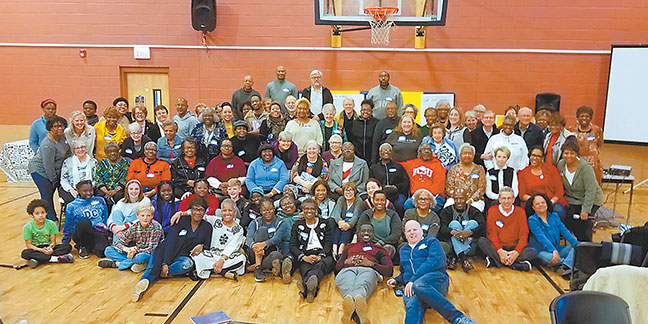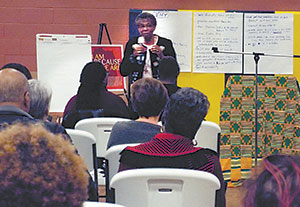CHARLOTTE — St. Matthew Church, the largest parish in the Diocese of Charlotte, has as its goal to become a place of encounter so that all who enter meet Jesus – no matter how big the parish family gets.
Situated in an area of Charlotte that has experienced phenomenal growth over the past two decades, St. Matthew Parish now has more than 10,700 registered families and more than 100 ministries spread across two campuses, one in Ballantyne and another in Waxhaw. The growth is expected to continue, so the parish is undertaking a new pastoral plan to help it prepare for the future and meet the needs of its numerous parishioners.
The 2019-’21 Parish Plan will primarily focus on three areas: “Feeding the Sheep” (parishioners attending Mass), “Feeding the Shepherds” (parishioners attending Mass and participating in ministry), and “Feeding the Multitudes” (reaching out to parishioners not attending Mass, former Catholics and people who do not practice any faith).
The plan will also aim to increase youth, young adult and family involvement in the parish. This will be done by: “Encounter” (meeting the youth and young adults where they are), “Form” (offering a variety of opportunities for youth and young adults to grow spiritually), and “The Send” (inviting participation in parish ministries and all aspects of parish life).
The plan will involve key improvements to the parish’s communications efforts as well as its facilities.
In preparation for the new pastoral plan, the parish council reviewed the latest studies by the Georgetown University-based Center for Applied Research in the Apostolate as well as parishioner surveys.
Father Pat Hoare, pastor, introduced the plan to the parish via a video message at all Masses the last weekend of September, inviting everyone to volunteer via an online response survey to become involved in one particular area of interest for them.
“We received nearly 200 responses, and have begun reaching out to those volunteers as we form implementation teams,” he said. “Four teams – The Sunday Experience, Evangelization and Engagement, Leadership Development, and Welcoming and Hospitality – have committed leadership and are having initial meetings. We have also begun some initial discussions and focus groups relating to other areas of the plan.”
The Parish Leadership Team meets weekly to consider activities in each of those areas and intends to work together to intentionally implement strategies and action items around each of the goals and pillars, he said.
Kathy Bartlett, parish director of liturgical ministries, has been at St. Matthew Parish since the first Mass was offered at a neighborhood movie theater in 1986.
“Boy, have things blossomed,” she says. “What I love most is the special congregation we have. There are so many people who will go beyond themselves to build, serve, grow in faith and spirituality creating a strong community of soldiers for Christ in so many different ways.
“I hope this new pastoral plan will bring forth a whole new crew of laborers to add to the existing crew. The ‘harvest’ is ripe.”
Bartlett thinks it is critical for the parish to increase the involvement of the parish’s young adults and teenagers – “our future,” she says.
“And,” she adds, “that we continue to affect the spiritual growth of everyone, even those not necessarily sitting in our pews, is my biggest hope and area of excitement.”
The parish must “aid in unleashing the power of the Holy Spirit in everyone God allows us to touch, thereby fostering that personal relationship with Christ, our foundation,” she says.
Diane Kiradjieff, parish director of faith formation, is also excited about implementing the new pastoral plan.
“I am blessed to have been a part of putting together and to be a part of putting into action the second goal, which focuses on our youth and young adults,” Kiradjieff says.
“Our three-step approach begins with the encounter – seeking to bring the Church to the youth and young adults, rather than just get them to church. Intentionally meeting them where they are at, creating the excitement and opening – or re-opening – the door to a relationship with Christ,” she says. “Next is to provide opportunities for them to form and energize that relationship through continued encounters in the Eucharist, Scripture, service opportunities and exposure to the teachings of the Church.”
“Honestly, I cannot say that it is a revolutionary approach,” she notes. “Rather, we took a page out of Church history – looking to the first disciples and how they grew the Church: encounter those who had not heard about Jesus, form them by teaching them about Jesus, and send them to share the Good News with others.”
The 2019-’21 Pastoral Plan states four overarching goals for St. Matthew Parish for the future: to become a place of encounter so that all who enter its doors meet Jesus; to share God’s loving and saving plan with all; to build a new generation of leaders filled with the joy of the Gospel; and to be an amazing parish.
— SueAnn Howell, senior reporter
 CHARLOTTE — Conversations about how to combat racism are continuing among Catholics in Charlotte, and their latest effort to encourage racial unity and promote social justice featured the leaders of Pax Christi USA.
CHARLOTTE — Conversations about how to combat racism are continuing among Catholics in Charlotte, and their latest effort to encourage racial unity and promote social justice featured the leaders of Pax Christi USA.
Pax Christi USA is a national Catholic peace movement founded in 1972, part of Pax Christi International. Sister Patricia Chappell, its executive director, and Sister Anne-Louise Nadeau, director of programs, were hosted by Our Lady of Consolation Parish in Charlotte Nov. 16-17, where they met with local Catholic leaders from parishes that have been working to bridge the divide between races in Charlotte following racial protests that erupted in 2016. The racial protests, sparked by a police shooting, led to the death of a young member of Our Lady of Consolation Parish.
Members from that parish joined with parishioners from St. Peter, St. Gabriel, St. Luke and St. Matthew churches – vowing to improve racial relations among Catholics, one person, one conversation, one encounter at a time.
Pictured: People gathered to hear Sister Patricia Chappell, executive director of Pax Christi USA and member of the Sisters of Notre Dame de Namur, speak at Our Lady of Consolation Church in Charlotte Nov. 16-17. (Photo provided by Morris Whitaker)
Catholic teaching is clear, both sisters noted in their talks: racism is a sin and every Catholic has an obligation to speak out against it.
“We have to deal with economic and interracial injustice,” said Sister Patricia. “Being a Catholic organization, we must begin with our own beloved Church.”
Sister Patricia noted the U.S. bishops’ approval last week of a new pastoral letter against racism, “Open Wide Our Hearts: The Enduring Call to Love.”
“Despite many promising strides made in our country, racism still infects our nation,” the pastoral letter stated. “Racist acts are sinful because they violate justice. They reveal a failure to acknowledge the human dignity of the persons offended, to recognize them as the neighbors Christ calls us to love.”
The pastoral letter also stated: “As Christians, we are called to listen and know the stories of our brothers and sisters. We must create opportunities to hear, with open hearts, the tragic stories that are deeply imprinted on the lives of our brothers and sisters, if we are to be moved with empathy to promote justice. ...We must invite into dialogue those we ordinarily would not seek out. We must work to form relationships with those we might regularly try to avoid.”
Sister Patricia noted that the bishops called for concrete steps to combat racism – covering topics such as racial slurs and jokes to racial profiling, xenophobia and anti-immigrant sentiments. Racism is a personal sin, but also a collective or social sin, she emphasized.
“We as parishes and dioceses are going to be mandated, not just if we feel like it, but mandated, to look at the issues of systemic racism,” Sister Patricia said. “We need to get behind our bishop, our clergy, our systems and our diocese, or it won’t happen.”
Nearly all of the U.S. bishops, including Bishop Peter Jugis, voted for the pastoral letter, she noted, “but we cannot be satisfied until it is spoken about on every pulpit, talked about in every school, in every diocese and in every office. It’s our mandate, as baptized Catholics, to be concerned about systemic racism. We have no other choice (but) to be our sisters’ and brothers’ keeper. You and I are the Church, but some of us don’t believe it. Therefore, some of us get scared to address the bishop or the Church. Catholic social teaching says to every one of us: we have the right to organize.”
 Sister Patricia Chappell spoke as part of an ongoing campaign by several Charlotte parishes to encourage dialogue between white and black Catholics and promote racial unity in Charlotte. (Lisa Geraci | Catholic News Herald)In her remarks, Sister Anne-Louise acknowledged that confronting with honesty the impacts of “white privilege” on her own life has been difficult.
Sister Patricia Chappell spoke as part of an ongoing campaign by several Charlotte parishes to encourage dialogue between white and black Catholics and promote racial unity in Charlotte. (Lisa Geraci | Catholic News Herald)In her remarks, Sister Anne-Louise acknowledged that confronting with honesty the impacts of “white privilege” on her own life has been difficult.
“I have lost friends during the way, but I like the woman I have become,” she said.
Talking about race, Sister Anne-Louise emphasized, “is not about putting more guilt on people, it is not about shaming. It is just about talking about the truth, and sometimes the truth has got to hurt a little bit before anything good comes out of it.”
As with past events, participants gathered in small groups to talk about racism, their own experiences and memories, and how their Catholic faith informs their view of the problem. Several people brought up instances where they were discriminated against, or heard family members use racially-tinged terms in referring to people of color. Some said they felt embarrassed to talk about race, or pressured not to talk about it.
“We must deal with systemic racism that exists in our Catholic Church, systemic racism that exists in our nation and in the world. We have to be able to do it openly, honestly, relevantly – but also frankly,” Sister Patricia said. “In order to be in right relationships, we need to be able to tell the truth. People of color, we can’t do it by ourselves, because if we could have, we would have done it a long time ago. White folk, you can’t do it by yourselves. We have to do it together. But in order to do it together we have to deal with the pain and the hurt, with the rage, and the reverence of who we are called to be, and that is children of God. We are all called to be children of God.”
The day ended with suggestions for practical action, including: finding ways (individually and collectively) to get out of one’s social, racial and cultural “comfort zone”; being more empathetic; reaching out to others and finding ways to work together; addressing the “isms” of society with children; reaching out across parishes and continuing cross-cultural work; forming a delegation to dis-cuss with Bishop Jugis how the Charlotte diocese could implement the new pastoral letter; and fostering further discussion.
— Lisa Geraci, correspondent
More online
Read the full text of the U.S. bishops’ new pastoral letter against racism, “Open Wide Our Hearts: The Enduring Call to Love”

